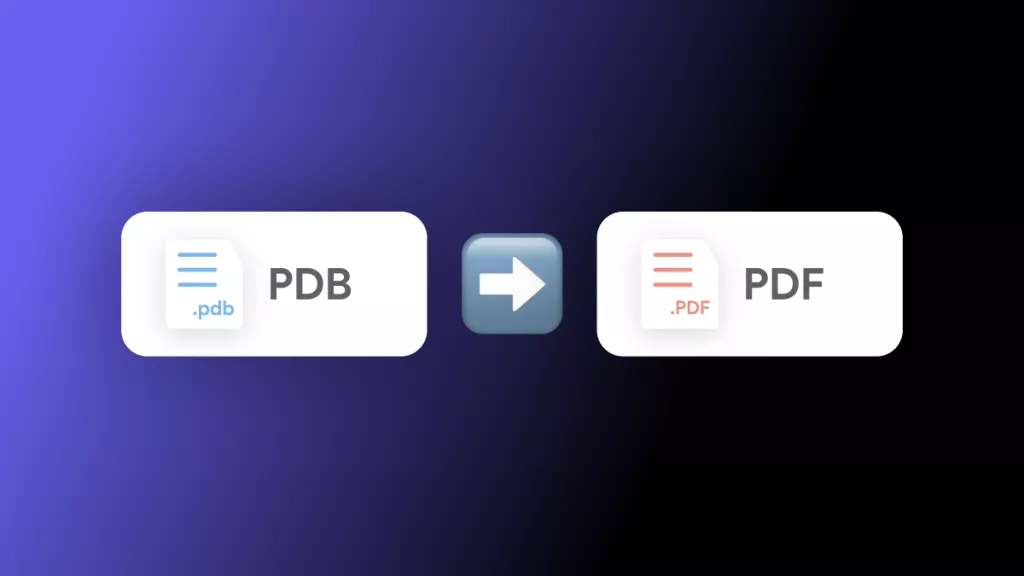File syncing, or file synchronization, ensures that two or more files are kept identical or updated across different devices. It involves the automatic updating of files between these devices, irrespective of geographical location. Hence, the changes made to one file are automatically reflected on all devices in the same network.
Meanwhile, this article will discuss ways on how to sync files. You will also learn about a dedicated tool that provides top-level cloud-based syncing.
What Does It Mean to Sync Files?
This is the age of the internet and technology, and file syncing is the digital revolution. Basically, syncing files means synchronizing the contents of multiple files or folders across different devices or platforms. Syncing happens by updating files in such a way that they reflect each other while being accessible on various platforms.
Apparently, syncing is based on cloud storage that allows accessing the same data across devices within different locations. Thus, the changes made on one device will automatically appear on all other devices. However, it's essential that all devices are logged in with the same syncing account.
How to Sync Files with UPDF Cloud?
Cloud technology stores, manages, and processes data and information using remote servers. Meanwhile, if you're looking for the best PDF online collaboration facility, UPDF is the ideal cloud-based document tool. After all, this platform provides cloud-based storage to make your work efficient and productive. Simply upload your documents, and access them on all devices within the same shared account.
Windows • macOS • iOS • Android 100% secure
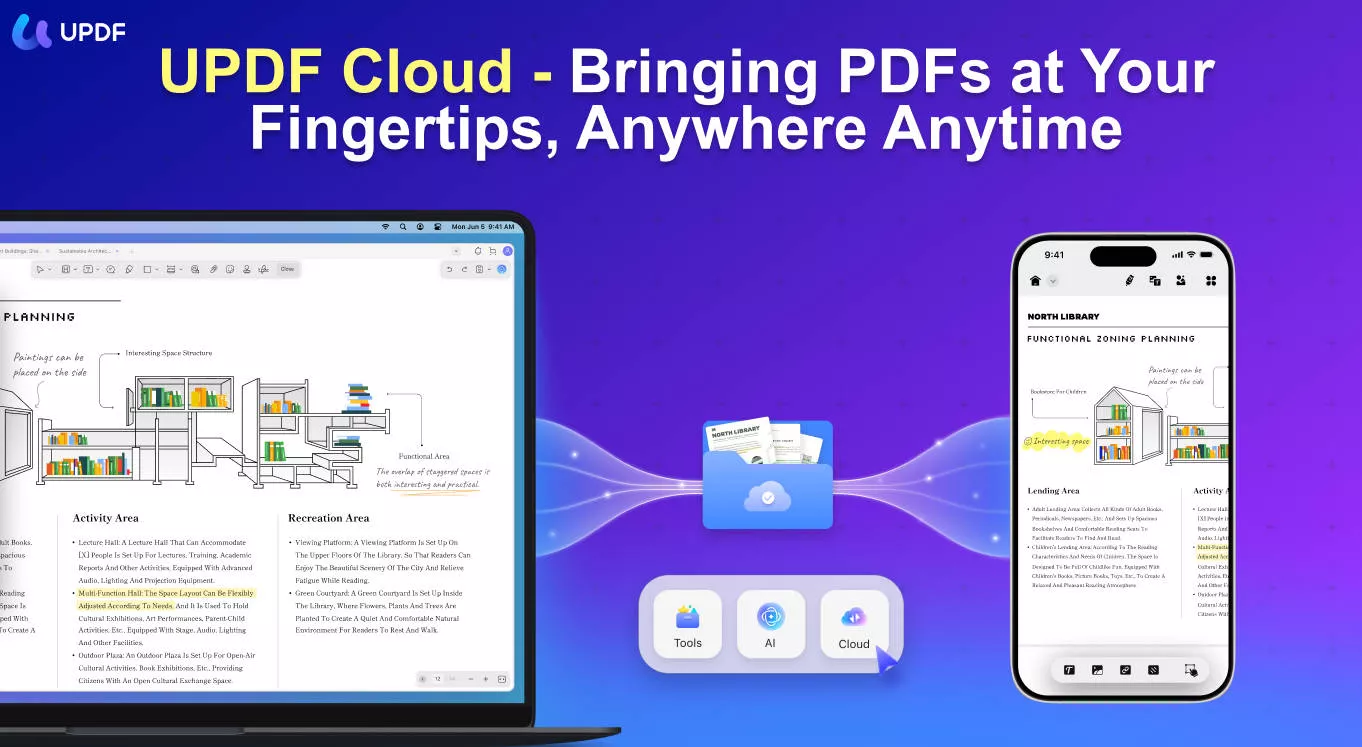
Meanwhile, the real-time synchronization support allows reflecting PDF document changes on all devices. Interestingly, your documents remain safe and secure because of high-profile encryption. Data loss is not an issue on this network. To sync files using the innovative UPDF Cloud feature, follow these straightforward steps:
Step 1: Login into Account Credentials
Make sure to login into your UPDF account within different devices and platforms with the same account. This powerful cloud-based tool is available on Mac, Windows, Android, and iOS. Ultimately, your devices will sync together to allow collaboration on uploaded documents.
Step 2: Upload File into UPDF Cloud
Afterward, launch UPDF on your computer and click "Cloud" from the left side of the home screen. Tap on the "Upload to Cloud" tab and begin to select and upload your files. Your uploaded files will reflect on all devices instantly.
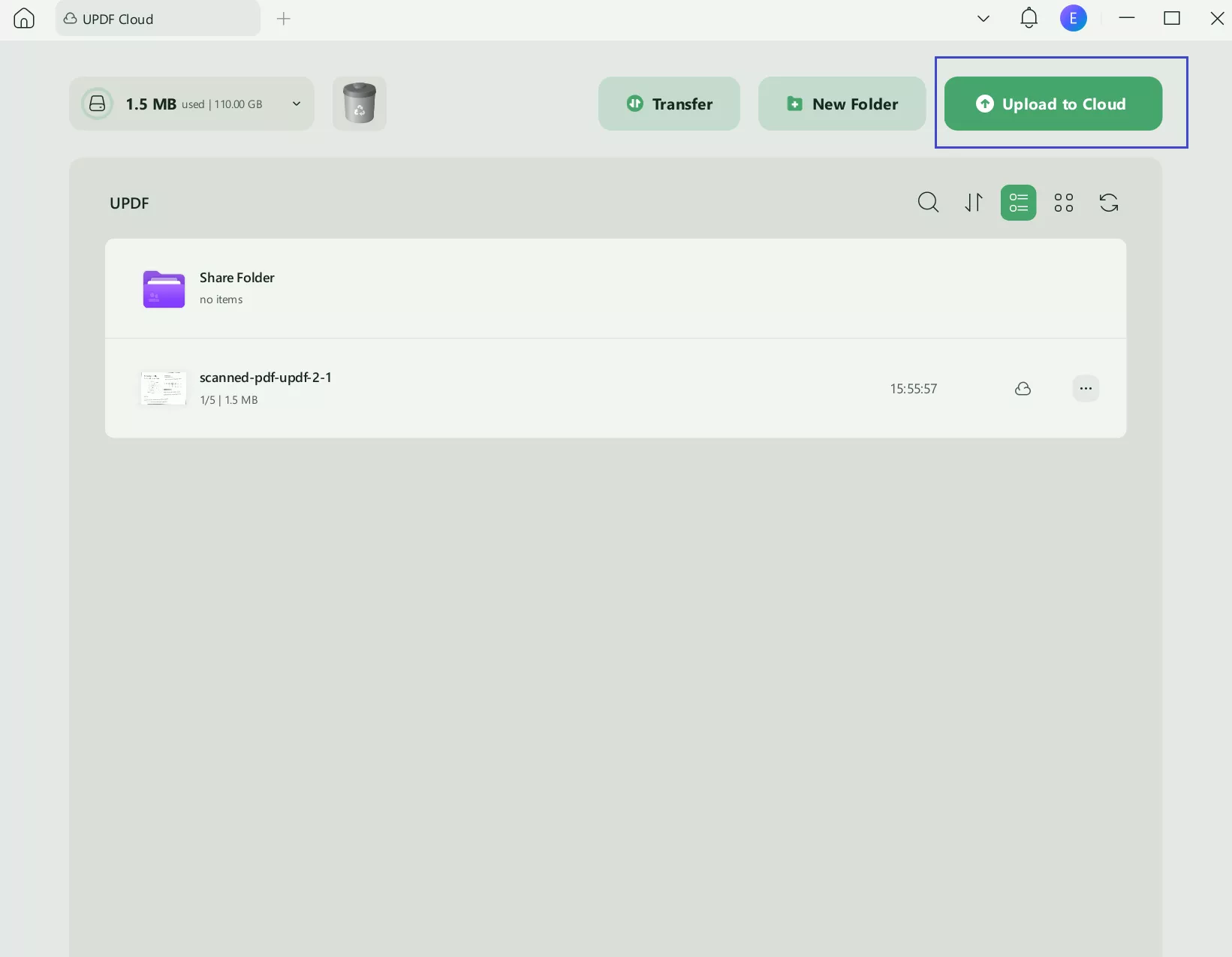
Step 3: Sync Any Changes to the Files Automatically
Your uploaded file will get opened in the UPDF, and you can edit the document from "Edit," "Comment," "Organize Pages," and more modes.
After the editing, you can simply save it by pressing "Ctrl/Command + S". The changes are automatically updated and saved on all devices due to cloud syncing.
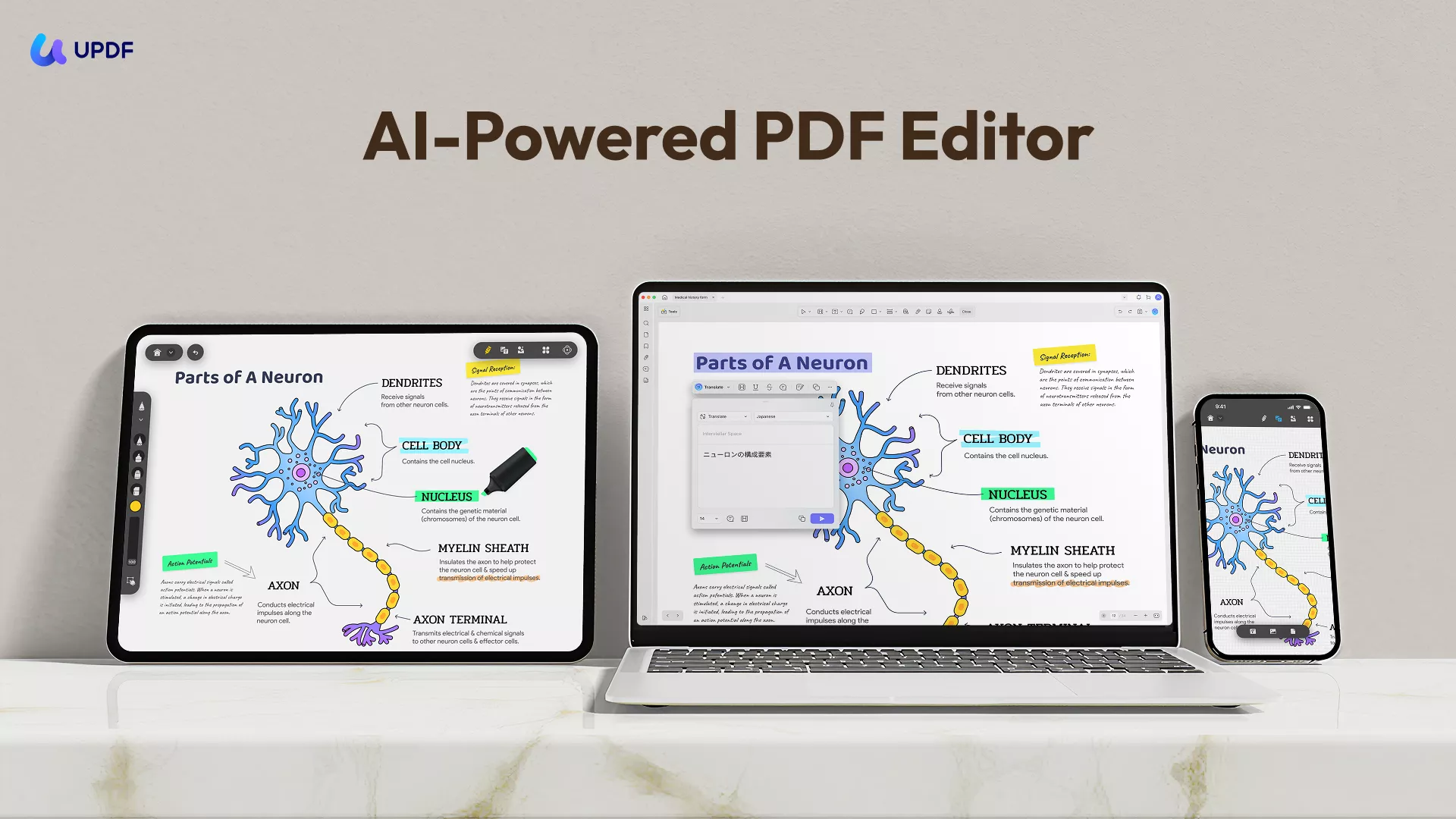
What is Sync Folder?
In general, a sync folder is a feature provided by various cloud storage and file synchronization services. It refers to a specific folder on your computer or device that is automatically synchronized with a corresponding folder in the cloud. So, when you place files or make changes to files within a sync folder, those changes are automatically mirrored or uploaded to the cloud storage service.
To be precise, sync folders enable seamless file management across platforms. Thus, providing an efficient way to keep the document files up-to-date and easily accessible on computers, smartphones, or tablets with the availability of an internet connection.
How to Sync Folders?
Syncing folders is essential not only to collaborate on storing and managing documents, including PDFs but also to assist people looking to back up their essential data. With real-time synchronization, sync folders can organize and reflect document changes in an automatic way, which is then accessible to all devices. For syncing folders, there are three ways to proceed with:
Method 1. How to Sync Folders using Google Drive
Google Drive is a reliable and oldest cloud storage and file synchronization service developed by Google in 2012. It allows users to store, access, and share their files from any device with an internet connection. The platform supports a wide variety of file types, including documents, spreadsheets, presentations, images, audio files, and video files.
This productivity suite incorporates Google Docs, Google Sheets, Google Slides, Gmail, and more. To use Google Drive for creating sync folders, these simple steps will help you move forward conveniently and efficiently:
Step 1: Download the official application of Google Drive on your computer and click "Sign in with browser" after launching it. After this, press the "Add Folder" button and choose the folder you want to sync with Google Drive.
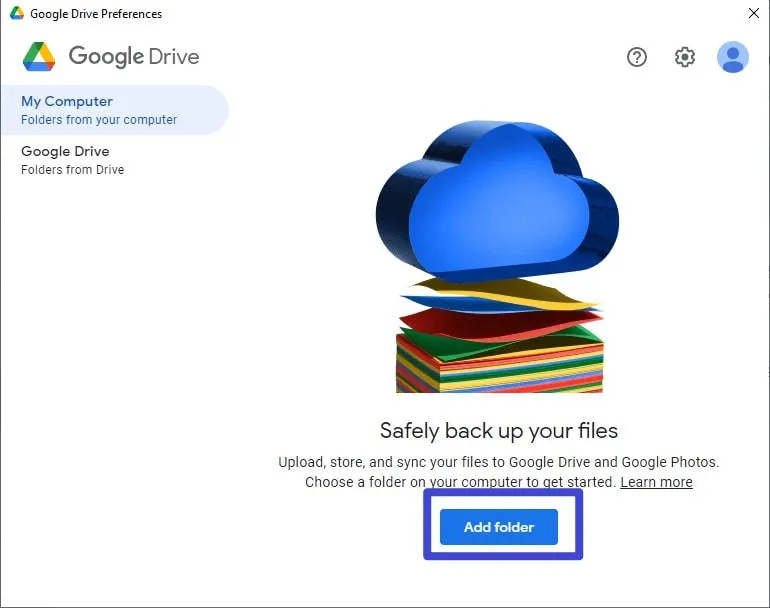
Step 2: Afterward, enable the "Sync with Google Drive" feature and press the "Done" button to add the synced folder successfully. Click on the "Save" button from the bottom right corner of the Google Drive app interface to save all the pending changes.
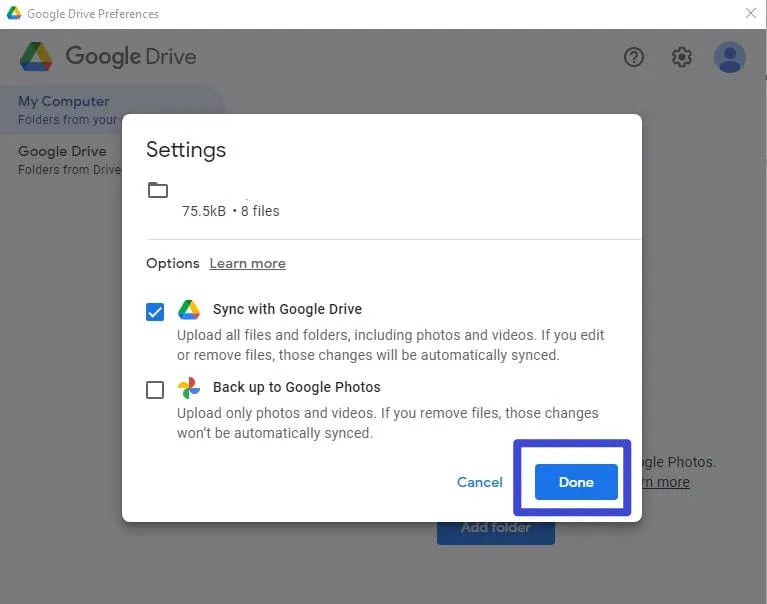
Method 2. How to Sync Folders using OneDrive
OneDrive is one of the popular cloud storage services provided by Microsoft that allows users to store and sync files and folders across multiple devices. Meanwhile, the synced data can be accessed with an internet connection anytime, anywhere. It's possible to store photos, videos, and files, and users can get 5 GB of free cloud storage. To sync folders on the OneDrive platform, follow these simple step-by-step instructions:
Step 1: From your PC's taskbar, click the OneDrive application icon. Select the "Help & Settings" option, then choose "Settings." You will see the Microsoft OneDrive window on your screen. Select the "Account" option from the top and then tap the "Choose Folders" button.
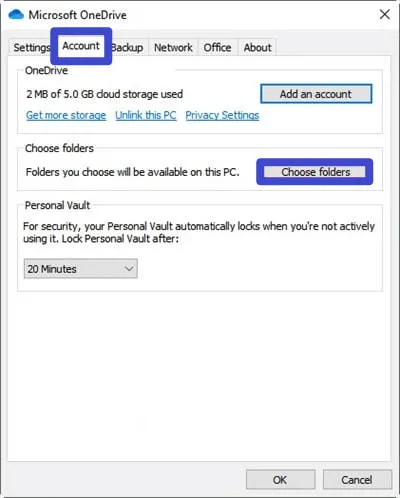
Step 2: Different folder lists will appear on your screen, and you need to select your desired folders by check-marking them. Finally, click on the "OK" button to sync folders to OneDrive, and these folders will start showing in the File Explorer of your Windows PC.
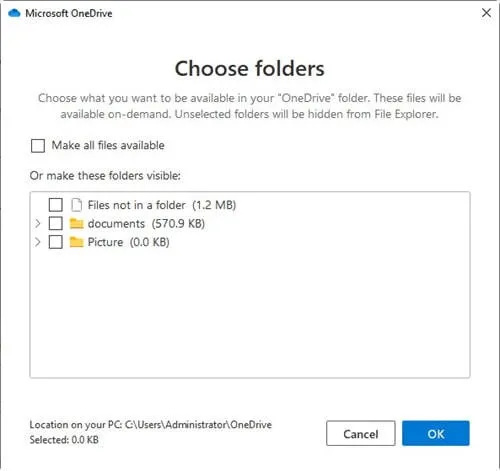
Method 3. How to Sync Folders using FreeFileSync
FreeFileSync is a third-party file synchronization software that creates backup copies of all your essential files by syncing data. Meanwhile, the platform has advanced syncing modes, including two-way, real-time, and mirror sync. Thus, your files are stored so they can be accessed from anywhere. To use FreeFileSync for syncing folders, these easy and simple steps can be of great assistance:
Step 1: After installing FreeFileSync on your computer, create a new task by clicking "Save as batch jobs" from the top-left corner. Provide a name to the task and set location. Afterward, press "Browse" from the left side to set the source folder to sync, and click "Browse" from the right to select the destination folder.
Step 2: Press the "Synchronization Settings" indicated in green for task customization, and here you can select between different syncing modes. Once your settings adjustment is completed, press "OK." You need to click "Compare" and see how the source and destination folders are distinct.
Step 3: Once the files are confirmed, move forward to click the ‘Synchronize" button. A pop-up will open from where you need to tap the "Start" button. The synchronization process will begin, and you need to click "Close" once the process ends.
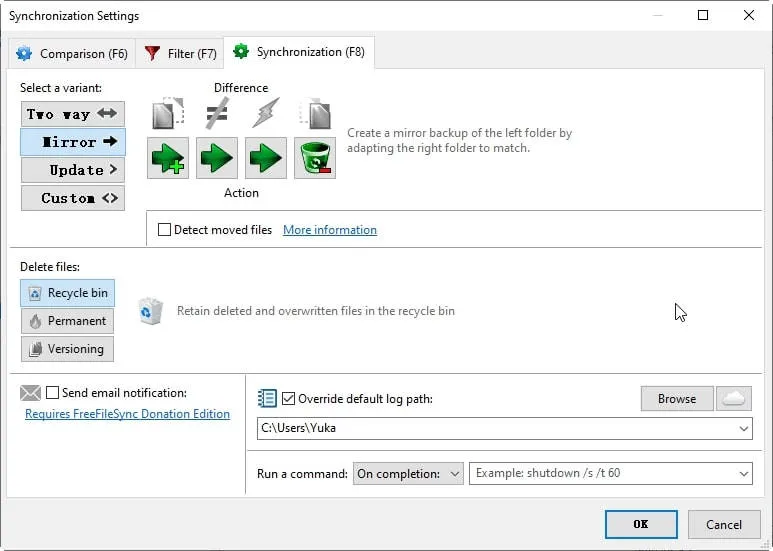
Final Words
Synchronization of files is an important way to collaborate and access documents and other data across devices within different locations. Apparently, file syncing is directly dependent on cloud storage. You learned various techniques to sync files and folders in this article. A better and more reliable option is UPDF Cloud, which is fast, efficient, and secure in its file synchronization services.
Windows • macOS • iOS • Android 100% secure
 UPDF
UPDF
 UPDF for Windows
UPDF for Windows UPDF for Mac
UPDF for Mac UPDF for iPhone/iPad
UPDF for iPhone/iPad UPDF for Android
UPDF for Android UPDF AI Online
UPDF AI Online UPDF Sign
UPDF Sign Edit PDF
Edit PDF Annotate PDF
Annotate PDF Create PDF
Create PDF PDF Form
PDF Form Edit links
Edit links Convert PDF
Convert PDF OCR
OCR PDF to Word
PDF to Word PDF to Image
PDF to Image PDF to Excel
PDF to Excel Organize PDF
Organize PDF Merge PDF
Merge PDF Split PDF
Split PDF Crop PDF
Crop PDF Rotate PDF
Rotate PDF Protect PDF
Protect PDF Sign PDF
Sign PDF Redact PDF
Redact PDF Sanitize PDF
Sanitize PDF Remove Security
Remove Security Read PDF
Read PDF UPDF Cloud
UPDF Cloud Compress PDF
Compress PDF Print PDF
Print PDF Batch Process
Batch Process About UPDF AI
About UPDF AI UPDF AI Solutions
UPDF AI Solutions AI User Guide
AI User Guide FAQ about UPDF AI
FAQ about UPDF AI Summarize PDF
Summarize PDF Translate PDF
Translate PDF Chat with PDF
Chat with PDF Chat with AI
Chat with AI Chat with image
Chat with image PDF to Mind Map
PDF to Mind Map Explain PDF
Explain PDF Scholar Research
Scholar Research Paper Search
Paper Search AI Proofreader
AI Proofreader AI Writer
AI Writer AI Homework Helper
AI Homework Helper AI Quiz Generator
AI Quiz Generator AI Math Solver
AI Math Solver PDF to Word
PDF to Word PDF to Excel
PDF to Excel PDF to PowerPoint
PDF to PowerPoint User Guide
User Guide UPDF Tricks
UPDF Tricks FAQs
FAQs UPDF Reviews
UPDF Reviews Download Center
Download Center Blog
Blog Newsroom
Newsroom Tech Spec
Tech Spec Updates
Updates UPDF vs. Adobe Acrobat
UPDF vs. Adobe Acrobat UPDF vs. Foxit
UPDF vs. Foxit UPDF vs. PDF Expert
UPDF vs. PDF Expert




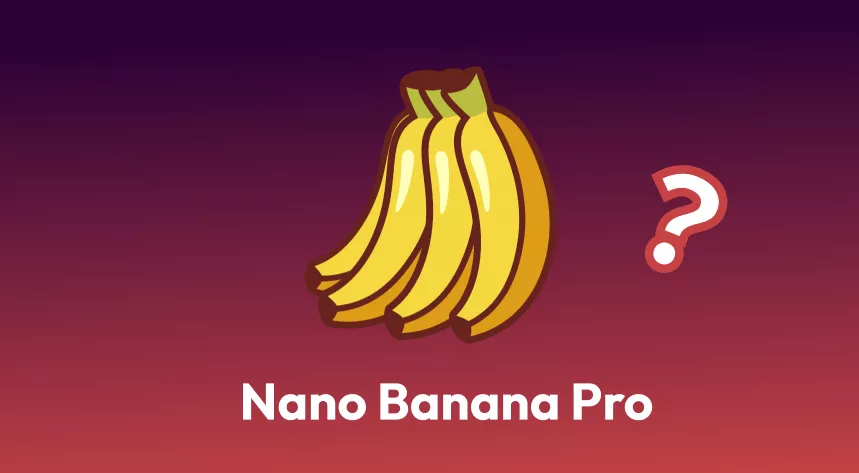
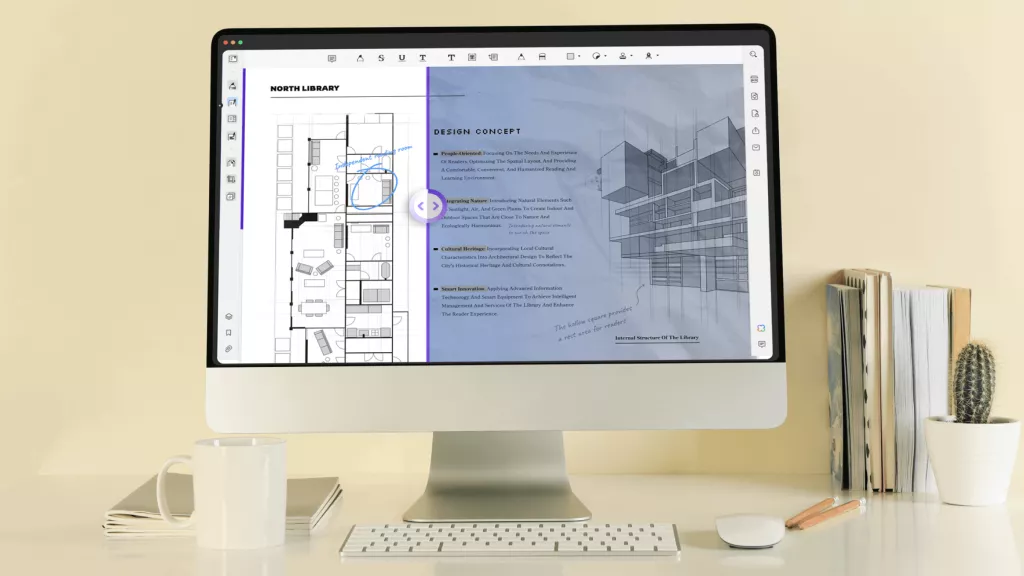
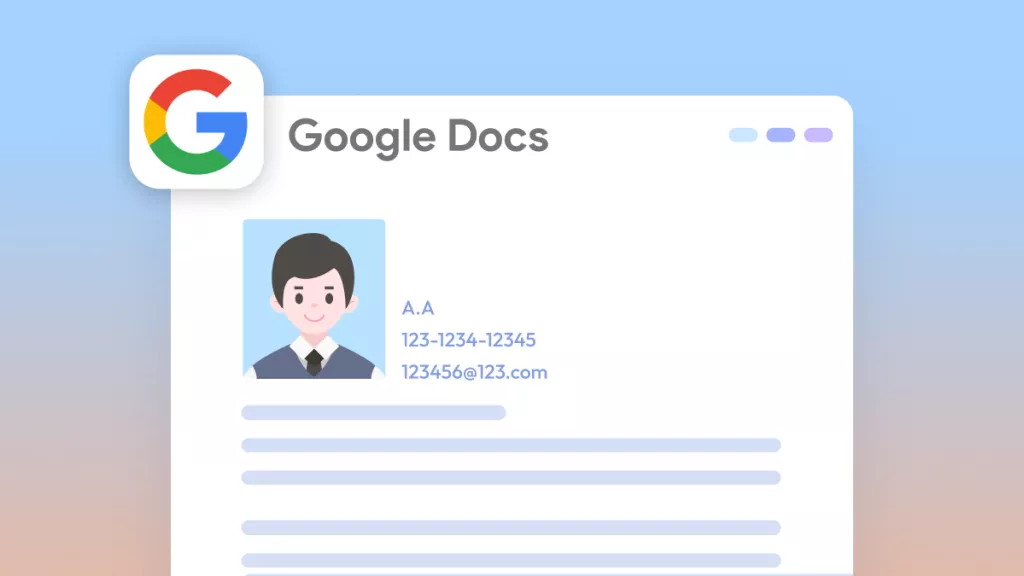

 Delia Meyer
Delia Meyer 
 Enya Moore
Enya Moore  Enola Davis
Enola Davis 